
The fifth season of Buffy The Vampire Slayer has a ruddy good go at jumping the shark not once, but twice, in its opening episode. Buffy Vs Dracula - for that is its name - sounds like a joke somebody made in a writers' room that got out of hand. What's next? Scooby Doo turning up?
In reality, this is a fun opener, free of the getting-over-the-events-of-last-season angst that is a more typical starting point for each year of the show. The Dracula mythos is referenced in a fun way, with Xander effectively becoming Renfield and Giles waylaid by sexy female vamps. While clearly powerful and charismatic, Dracula's mystique is somewhat undercut by Spike ("Poncy bugger owes me eleven pounds"), and although a decision was clearly made that Buffy couldn't be allowed to kill Dracula, she manages to emerge victorious as the "poncy bugger" slips away as mist.

In some ways, though, the whole Drac thing is almost a distraction, softening up the viewer for the episode's closing reveal as Buffy finds a young girl going through her things. There's a moment - perhaps two beats - where she's visibly confused about what's going on. And then Joyce pipes up from outside the room, asking Buffy to take "her sister" to the movies with her. And both girls turn to the door and, as one, complain "Mom!"
So, on the face of it, the show's creators have now introduced a never-before-mentioned sister - surely the most annoying way any show can introduce a character, by simply pretending that they'd been there all along. But, of course, this is Buffy. From the next episode, there are hints that new sister Dawn isn't all she seems, though it isn't imediately clear whether or not there's something malevolent about her. She is bloody annoying, though. With the bulk of the core characters presumably now approaching their twenties, there's something slightly retrogressive about focusing once more on a young teen, and I'm not sure Dawn is written all that sympathetically, whiny neediness often her primary setting.
It's a little while before we get to anything resembling an answer to Dawn's identity, but there are small developments for the other key cast members as we go along: Giles takes over the Magic Box shop, finally providing a base as a replacement location for the long-destroyed school library; Xander and Anya move in together at the end of entertaining double Xander episode The Replacement; Anya discovers capitalism from a board game; Joyce and Riley have health issues; Spike has a sexy dream about Buffy.
Any long-running show, certainly one which opts to tell a different story with each season, faces a problem in terms of escalation. If each new season doesn't present a knottier problem, a greater challenge or a more powerful threat, it can seem like the series is running out of steam. It's part of the reason why soap operas often seem to lose touch with the reality they're supposed to reflect, infesting neighbourhoods with ever-increasing numbers of old-school gangsters or serial killers, subjecting suburban streets or rural communities to a catalogue of explosions, fires or vehicular disasters - when, at heart, these shows are at their strongest when focusing more on well-drawn characters, humour and situations which feel real and relatable.
If we look at the villains Buffy has faced in the last two seasons (after it was decided that, contrary to the show's name, they'd run out of road if Buffy was always fighting vampires), it's clear that The Mayor and Faith worked because they were well-written, distinctive characters, and that Maggie Walsh and Adam didn't, and weren't. Adam represented an escalation in power, his composite nature providing a real challenge, but the strange mixture of single-mindedness and philosophical curiosity made for a rather flat Big Bad. And as for that costume...
From the first time that Buffy runs into Glory (also known as Glorificus or, simply, The Beast) it's clear that she is way more powerful than anything we've encountered before. When an episode finishes with head Watcher Quentin Travers revealing that she is, in fact, a god, it's a truly chilling moment.
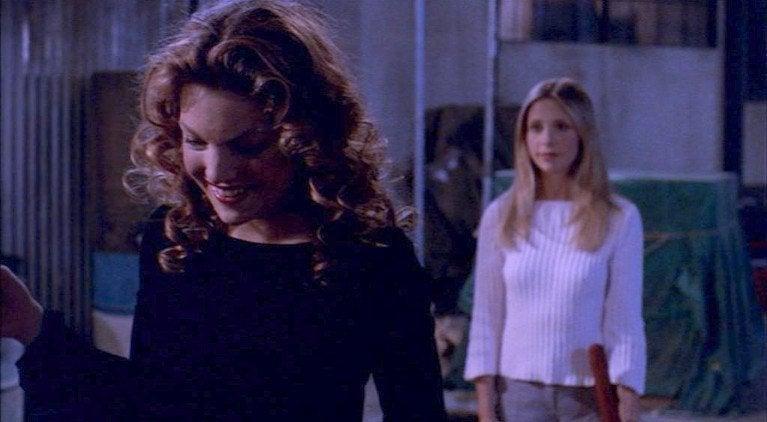
Crucially, though, she's also a compelling character: her confrontations with Buffy are full of the kind of back-and-forth banter that would have been impossible with dry old stick Adam, and she's clearly insane, vain, and easily distracted. All of these things could be seen as weaknesses that make her at least slightly beatable, though her main Achilles heel is that she spends most of her time trapped in the body of Ben, a buff medic who is, coincidentally, looking after Joyce in hospital. This situation is part of an impressively detailed mythos that is gradually revealed, involving rival hell gods, monks, comedy minions and medieval knights. Oh, and a mystical energy key which has been disguised as a human and sent to Buffy for protection, lest Glory find it and use it to, I dunno, break down the walls between dimensions and unleash Hell on earth, or something. Somebody was having a lot of fun with this.
It's a bit late to warn about SPOILERS, but I suspect that even if you've never seen this series, you've probably just worked out where Dawn came from.
So, we've got a suitably cataclysmic threat quite unlike anything Buffy has faced before, but this season also excels in its more character-driven moments. An early-ish example is the episode Family, where Tara's dad, brother and cousin turn up. It turns out that the womenfolk in the Maclay family are apparently all half-demon, and that this side is due to emerge from her imminent 20th birthday (this, it turns out, is absolute bullshit designed to maintain patriarchal dominance). This is set against a backdrop of Tara feeling somewhat excluded from the rest of the Scooby Gang, Willow aside, and with Buffy, Xander and Giles struggling to think what to get her for her birthday, as they don't really know her that well. But it all leads to a stand-off in the Magic Box, where Buffy and Dawn (and, quickly, everyone except Spike) refuse to let the Maclays take Tara. The power in this scene doesn't come from our knowledge that, far from being the "little girl" that Mr Maclay sees, Buffy could overpower him in an instant; it's her declaration, pertaining to Tara but really everyone on their side: "We're family."
Yep. Another tingle moment.
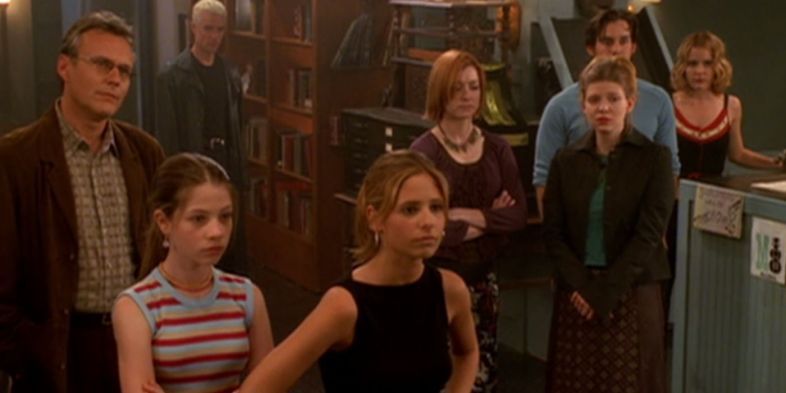
But actual Summers family business soon takes precedence. Buffy, Joyce and Dawn herself have to come to terms with the revelations about the latter's identity; thanks to the warping of reality and its existential retcon, they all still feel like sisters, daughters, a mother, but must deal both with the knowledge that it isn't real, and that Dawn is in huge danger of discovery by Glory, who has yet to learn the truth. On top of all this, Joyce is suffering with a brain tumour, although she has successful surgery. Hell, she's even dating again soon, for the first time since back in Season 2, when she hooked up with a mysogynistic robot with anger management issues.
And then comes the most powerful episode of the whole damn show, and certainly one of the best in the whole of TV history.
It actually starts with the end of the preceding episode, when Buffy returns home. We see, before she does, that Joyce is lying on the couch. But only when Buffy approaches, do we see along with her the strangeness of the way her mother is lying, the lifeless stare of her eyes. As Buffy says "Mom?... Mom?... Mommy?", partway between question and prayer, the heartbreaking truth dawns on both her and us.

Early in The Body, there are four or five minutes, including a lengthy one-shot sequence, focused exclusively on Buffy's immediate reaction. As she calls 911 and tries to resuscitate her mother, Sarah Michelle Gellar does a fantastic job of stripping away all of Buffy's superheroic qualities to reveal a frightened young woman struggling to come to terms with one of the most traumatic experiences that could happen to anyone. She's not The Slayer at this point, but a shellshocked Buffy Summers, and this isn't a situation that her powers can put right.
As an aside, it was absolutely the right decision to have Joyce's death be revealed as natural. With Glory having made specific threats against Buffy's loved ones, it would have been the easiest thing in the world to have her murder Joyce, but this episode would be much less powerful if it was intended just to show how evil Glory was. As a study of the death of a loved one, The Body would be diminished by a Buffy vs Glory face-off. Crucially, you can't seek revenge against an aneurysm.
While Gellar's performance is absolutely central, the reactions of those around her do much to enhance the emotional gut-punch of this episode. Willow's grief being channelled into stressing about what to wear to the hospital (and Tara comforting her), or Xander blaming the doctors who'd previously treated Joyce and punching a wall: these relatable reactions radiate believability from both actors and writers. And while Anya's reaction is, in part, based on her thousand-year old ex-vengeance demon not understanding how humans work thing, it still works as an expression of the disbelief that actual people feel in real life: " I don't understand how this all happens. How we go through this. I knew her, and then she's— there's just a body, and I don't understand why she just can't get back in it and not be dead... anymore! It's stupid! It's mortal and stupid! And... and Xander's crying and not talking, and... and I was having fruit punch, and I thought, well, Joyce will never have any more fruit punch, ever, and she'll never have eggs, or yawn, or brush her hair, not ever, and no one will explain to me why!"
No, you're crying.
The emotional detail of The Body works in juxtaposition with a feel that's different to other episodes; there's a stillness and calm about it, complete with an almost eerie absence of incidental music and focus on ambient sound. While an understanding of the characters might be essential to feel the absolute rawness of this episode, I certainly feel that someone who'd never seen Buffy The Vampire Slayer could watch it and appreciate how special these 44 minutes are. Although they might be baffled by the slightly shoehorned-in vampire-in-the-morgue sequence.
Aside from this masterpiece, the rest of the season's final stretch accelerates towards its endpoint, while also foreshadowing or setting up future events. Even the episode immediately prior to The Body, the seemingly throwaway I Was Made To Love You, introduces the odious Warren Mears and concludes with Spike commissioning a Buffy robot from him (it doesn't pay to think too closely about its original purpose, though - in yet another example of Buffy's doppelganger obsession, it will play an important part in the season's conclusion). Spike does at least go on to redeem himself (for now) by refusing to reveal The Key's identity to Glory under torture.
In terms of the old foreshadowing: Dawn and Spike (evidently never having read the story The Monkey's Paw) try to resurrect Joyce with magic, while later Tara is driven insane by Glory, prompting Willow to go full Dark Magic and seek revenge, in a scene which reveals how powerful a witch she has become. The seeds of the sixth season are pretty much laid right there.
When a brain-damaged Tara unwittingly reveals Dawn's identity to Glory, the Scooby Gang end up fleeing Sunnydale in a mobile home, apparently ignorant that whenever they leave town the shit hits the fan. Sure enough, before too long they've been attacked by those medieval knights, Giles has been impaled by a spear and there's a siege at an abandoned gas station. Who to contact to save Giles's life? What about that buff medic, Ben?
Whoops.
So, obviously Glory reasserts control of their shared meatshell and scarpers with Dawn, leading to a pretty cataclysmic finale as the Scoobs take on Glory and her minions to prevent Dawn being sacrificed and her blood being used to ritually bring about Sunnydale's latest apocalypse. The fight scene is decent, as the gang use the Buffybot, a magical orb, a troll's hammer (don't ask) and, er, a wrecking ball to subdue their enemy. With a dazed Ben once again in the house, Buffy spares his life - only for Giles, unbeknownst to the others, to suffocate him in order to permanently remove the threat of Glory's return, fulfilling an earlier statement by Mad Tara that he was "a killer".
That's not it, though. Dawn's still at the top of a tower (that apparently nobody in Sunnydale noticed being built) and demonic minor character Doc is still planning on going ahead with the ritual. Some shallow cuts are all that's required to open the inter-dimensional portal, and apparently the only way to close it is... look, it all gets a bit blurry in theory here, but Dawn can sacrifice herself to close it, but as they're sort-of sisters, Buffy's blood is apparently near enough, so the latter hurls herself into some CGI and averts the crisis. By, er, dying.
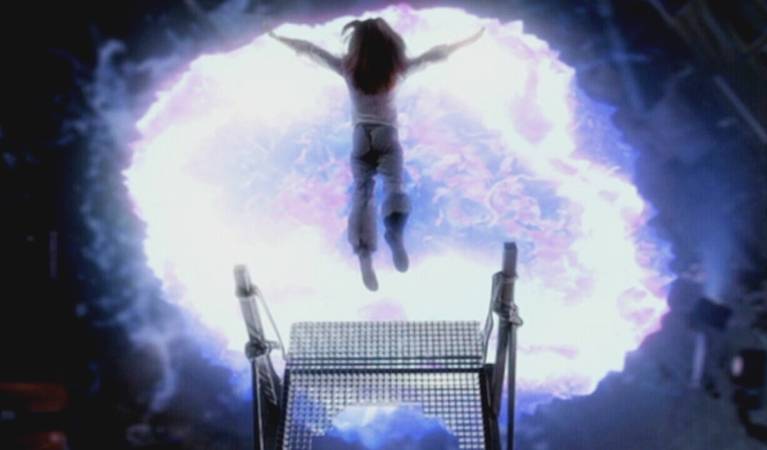
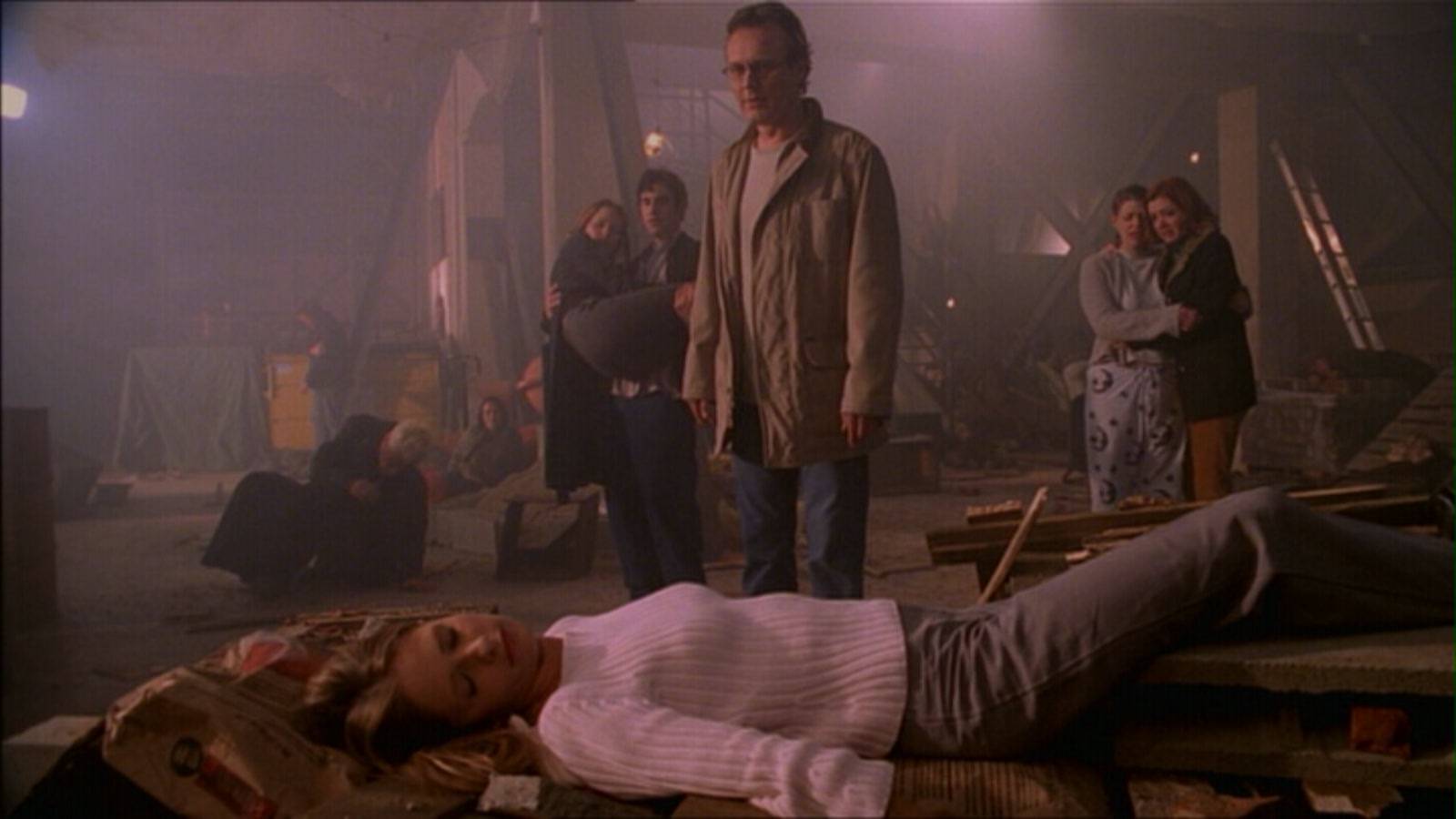
The season ends with Buffy's gravestone, complete with epitaph 'She Saved The World. A Lot.'

Next time: they probably should have left it there.
No comments:
Post a Comment